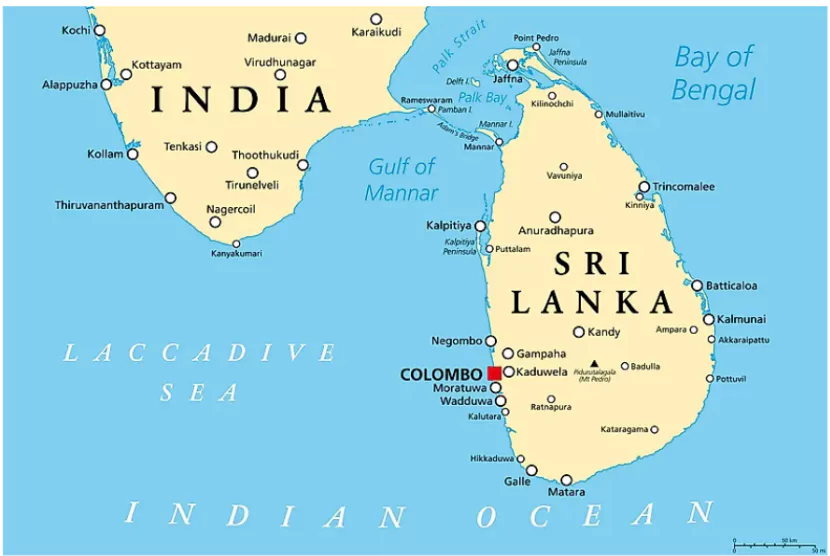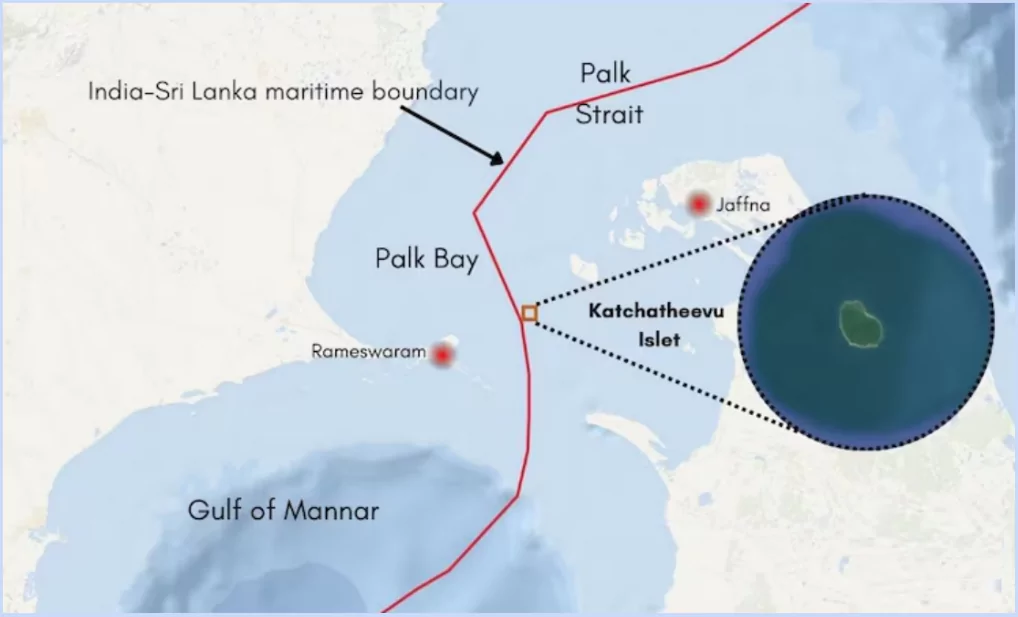The prolonged dispute over fishing rights in the Palk Bay, particularly around Kachchatheevu Island, has led to frequent tensions between Indian and Sri Lankan fishermen.
Background of the Dispute

- The India-Sri Lanka fishing dispute is a long-standing issue rooted in historical, geographical, economic, and political factors.
- The 1974 and 1976 bilateral agreements between India and Sri Lanka established the International Maritime Boundary Line (IMBL), dividing the waters between the two nations.
- 1974 Agreement: India ceded the island of Katchatheevu to Sri Lanka, a move that remains controversial in India, especially in Tamil Nadu.
- 1976 Agreement: Further clarified the maritime boundary and fishing rights, restricting fishermen from both countries from crossing into each other’s waters.
- Kachchatheevu Island: A small, uninhabited island in the Palk Bay, ceded to Sri Lanka by India through the 1974 Indo-Lanka Maritime Agreement.
- Traditional Fishing Rights: Indian fishermen, particularly from Tamil Nadu, have historically fished in these waters, leading to conflicts post-1974.
- Ecological Concerns: Indian fishermen often use bottom trawling, which is highly destructive to marine ecosystems, damaging coral reefs and depleting fish stocks.
Recent Escalations
- Arrests and Seizures: Recently, 14 Indian fishermen from Tamil Nadu were arrested by Sri Lanka’s Navy. Sri Lanka also seized 2 of their fishing boats (trawlers).
- In 2024, the Sri Lankan Navy arrested 146 Indian fishermen and seized 18 boats, escalating tensions.
- Protests by Sri Lankan Fishermen: Fishermen from Jaffna, Mullaitivu, and Mannar districts have protested against Indian fishermen, accusing them of illegal fishing and ecological damage.
- Safety Concerns: Incidents of Indian fishermen being apprehended or facing violence have raised concerns in Tamil Nadu.
Kachchatheevu Island
- Kachchatheevu is an uninhabited island that has been a point of discussion in India-Sri Lanka relations.
- Historically, it was used by fishermen from both countries.
- The island was ceded to Sri Lanka by India through the 1974 Maritime Boundary Agreement.
- The island’s strategic location in the Palk Strait makes it significant for maritime boundaries and fishing activities.

|
Implications of the Indo-Sri Lanka Fishing Conflict
- Impact on Fishermen’s Families: The arrest and imprisonment of Indian fishermen by the Sri Lanka Navy causes financial distress to their families.
- Loss of Life: Sea conflicts have led to fatalities and missing fishermen, increasing risks for fishing communities.
- Increased Cost of Surveillance: Patrolling the International Maritime Boundary Line (IMBL) requires significant resources from the Indian Coast Guard and Sri Lanka Navy.
- Smuggling and Security Concerns: Smugglers exploit the disputed region for trafficking drugs, weapons, and contraband.
- Strained India-Sri Lanka Relations: Allegations of harsh treatment of Indian fishermen by the Sri Lanka Navy fuel diplomatic tensions.
- The conflict has influenced India’s stance on UN resolutions against Sri Lanka regarding human rights violations.
- Example: India’s 2012 and 2013 support for UNHRC resolutions on Sri Lanka was partly influenced by domestic pressure over the fishing issue and Tamil concerns.
- Environmental Impact: Bottom trawling by Indian fishermen damages the seafloor, fish breeding grounds, and coral reefs.
International Laws on Freedom of Fishing
International laws regulate fishing activities to ensure sustainable use of marine resources while respecting the rights of coastal states and high seas governance.
- UN Fish Stocks Agreement (UNFSA, 1995): Encourages states to become members of Regional Fisheries Management Organizations (RFMOs) or agree to their conservation and management measures.
- RFMOs are international organizations responsible for regulating fish stocks in specific ocean regions.
- UNFSA ensures equitable access to fishery resources while preventing overfishing and resource depletion.
- United Nations Convention on the Law of the Sea (UNCLOS, 1982): Article 87 – Freedom of the High Seas.
- UNCLOS limits absolute fishing freedom by requiring states to comply with conservation regulations.
- It prohibits fishing by vessels from states that fail to meet conservation requirements.
- Regional and Customary Laws: Several regional agreements complement UNCLOS and UNFSA, such as:
- Indian Ocean Tuna Commission (IOTC) – Manages tuna fishing in the Indian Ocean.
- Convention on Biological Diversity (CBD) – Encourages sustainable marine resource use.
|
Challenges in Resolving the Dispute
- Legal and Diplomatic Hurdles: Unlike in the past, when arrested fishermen were quickly released, recent years have seen stricter enforcement of maritime laws, leading to convictions and fines.
- Economic Dependence: Fishing is a primary livelihood for communities on both sides, making it difficult to impose restrictions or changes in fishing practices.
- Environmental Degradation: Overfishing and destructive practices like bottom trawling threaten the marine ecosystem, exacerbating tensions between the two nations.
Way Forward
- High-Level Bilateral Talks: Organize high-level meetings between the Indian and Sri Lankan governments to address the issue comprehensively.
- Ensure the participation of the Tamil Nadu government and fishing communities of both countries in negotiations to make the process inclusive and representative.
- Promote Sustainable Fishing Practices: Encourage Indian fishermen to transition from ecologically destructive practices like bottom trawling to sustainable methods such as deep-sea fishing.
- Joint Conservation Efforts: Collaborate on marine conservation projects to protect fish stocks and biodiversity in the Palk Bay and Gulf of Mannar regions.
- Use Technology for Monitoring and Regulation: Provide GPS devices to fishermen and use satellite imagery to monitor fishing activities
- Address the Kachchatheevu Issue: Explore a model similar to the Tin Bigha case between India and Bangladesh, where a lease agreement allows shared use of the disputed territory.
- Legal and Policy Reforms: Re-examine the maritime boundary agreements to address the concerns of Tamil Nadu fishermen and ensure equitable access to resources.
Conclusion
The India-Sri Lanka fisheries dispute is a complex issue with legal, environmental, and socio-economic dimensions. A sustainable resolution requires proactive diplomacy, community engagement, and a shift toward eco-friendly fishing practices.
![]() 13 Feb 2025
13 Feb 2025

